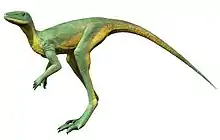Eucoelophysis
Eucoelophysis (meaning "true hollow form") is a genus of dinosauriform from the Late Triassic (Norian) period Chinle Formation of New Mexico. It was assumed to be a coelophysid upon description,[1] but a study by Nesbitt et al. found that it was actually a close relative of Silesaurus,[2][3] which was independently supported by Ezcurra (2006), who found it to be the sister group to Dinosauria, and Silesaurus as the next most basal taxon.[4]
| Eucoelophysis | |
|---|---|
| Scientific classification | |
| Kingdom: | Animalia |
| Phylum: | Chordata |
| Clade: | †Silesauridae |
| Clade: | †Sulcimentisauria |
| Genus: | †Eucoelophysis |
| Species: | †E. baldwini |
| Binomial name | |
| †Eucoelophysis baldwini Sullivan & Lucas, 1999 | |
However, the relationships of Silesaurus are uncertain. Dzik found it to be a dinosauriform (the group of archosaurs from which the dinosaurs evolved), but did not rule out the possibility that it represents a primitive ornithischian.[5]
References
- Sullivan, R.M. and Lucas, S.G. (1999). "Eucoelophysis baldwini, a new theropod dinosaur from the Upper Triassic of New Mexico, and the status of the original types of Coelophysis". Journal of Vertebrate Paleontology 19(1): 81-90.
- Nesbitt, S.J., Irmis, R.B., and Parker, W.G. (2005). "A critical review of the Triassic North American dinosaur record." In Kellner, A.W.A., Henriques, D.D.R., & Rodrigues, T. (eds.), II Congresso Latino-Americano de Paleontologia de Vertebrados, Boletim de Resumos. Rio de Janeiro: Museum Nacional/UFRJ, 139.
- Nesbitt, S. J., R. B. Irmis, and W. G. Parker. (2007). "A critical re-evaluation of the Late Triassic dinosaur taxa of North America." Journal of Systematic Palaeontology, 5:209-243.
- Ezcurra, M.D. (2006). "A review of the systematic position of the dinosauriform archosaur Eucoelophysis baldwini Sullivan & Lucas, 1999 from the Upper Triassic of New Mexico, USA." Geodiversitas, 28(4):649-684.
- Dzik, J. (2003). "A beaked herbivorous archosaur with dinosaur affinities from the early Late Triassic of Poland." Journal of Vertebrate Paleontology, 23(3): 556-574.
This article is issued from Wikipedia. The text is licensed under Creative Commons - Attribution - Sharealike. Additional terms may apply for the media files.


